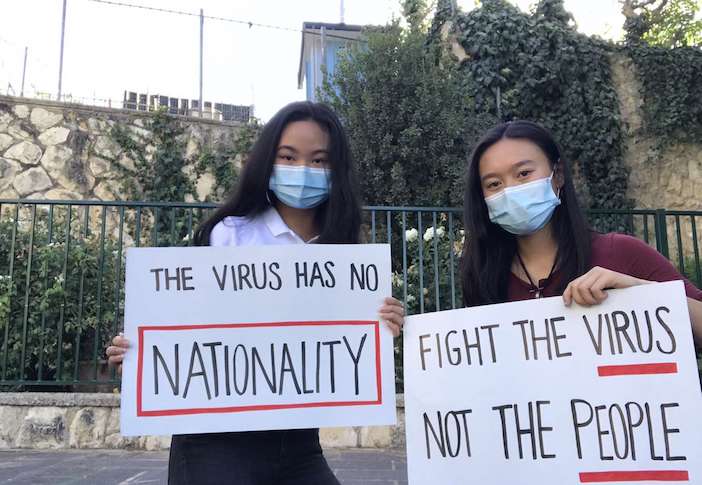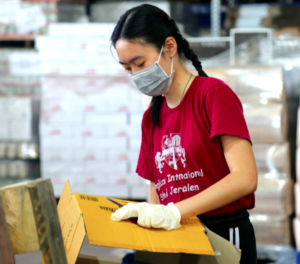The day before school finished for Chinese New Year, I left Beijing. It was to visit my mother, who works as a journalist abroad. I had lived there with her for two years before returning to my hometown to spend some time with my father and brush up on my Chinese.
Back in January, Coronavirus was but a distant rumor to us Beijingers and we paid little attention to the issue. The only thing that changed was a couple of people at the airport were wearing masks, so I decided to put one on too.

Around 5 days after my arrival, I heard the word ‘corona’ for the first time. There were four of us at a friend’s house. They were introducing a local food to me and we all shared bites of it, something utterly unimaginable today. The friend’s younger sister came out to the living room, an expression of unease across her face. She spoke in their native language with a troubled voice. My friend translated that she was concerned I carried the coronavirus. My first reaction was confusion. The disease was just as much of a mystery to me as it was to them. I quickly forgot about her remark and went about my day.
Turns out, when my friend’s mother, ironically a pharmacist, discovered a Chinese had been in their house, she was enraged. She threw out the bowl and spoon I ate with, and basically disposed of everything I touched. At that moment, I couldn’t help but feel a little hurt. Little did I know there would be no flights home and this would mark the start of a rollercoaster ride through a less spotlighted side of the pandemic.
On Valentine’s Day, a different friend and I hosted a sleepover. We roamed the streets dressed in onesies, feasting on chocolate. Along the way, our paths crossed with a group of boys, some looked ten while others in their teenage years like me. To my surprise, they began following us. The oldest boy chanted ‘Corona’ in a mocking tone. The rest repeatedly ran up to me coughing and immediately sprinted away screaming ‘I’m gonna die’. This went on for 20 minutes until they got bored and left us alone.
Since then, I learned to put a hood on, wear sunglasses, or do anything that made my race slightly less identifiable. Of course, that made minimal difference. It got to the point where every time I left the house, at least one driver would roll down their window and call out ‘Corona’ as they passed me. When I sat down on buses, everyone around me would move. When I stood in line at supermarkets, other customers would shoo me away. But through all this, I held my head high.
A friend of mine was a college student and she invited me to attend her classes. The thought of experiencing college life beforehand excited me. Unfortunately, as soon as I stepped through the door, I heard the professor exclaim from the front of the class: “I don’t want a Chinese in my class!” She paused for a moment before adding: “Because of the virus, you know.” For the first time, I argued back, pulling out statistics and scientific proof, leaving her speechless.

In early March, a nationwide festival was held. As I was leaving, I bumped into a former friend. The awkwardness was expected, but what I didn’t expect was for him to greet me with: “Don’t you have the corona? Oh sorry, I meant the Covid-19.” He laughed it off and beamed at his wittiness. It was a different feeling hearing insults from strangers than from someone I’m familiar with. And this was the first remark of that sort.
The real nightmare began merely days after this. At first, there were only a handful of cases, but that number quickly doubled, tripled, quadrupled, and skyrocketed as the months progressed. In fact, it wasn’t the Chinese, or any Asian country, that brought the virus here.
We went into quarantine and lockdown. Wearing masks in public became mandatory, shops and schools shut down, and gatherings were strictly prohibited. I found it extremely difficult to be isolated from society, but this time of solitude allowed me to look back on all that had happened. I realized, even though it’s the bad experiences that left the deepest impression, there was actually a silver lining to every incident.
When my friend’s mother threw out everything I touched in their house, my friend didn’t cave into the ignorance and treat me the same way. When the children followed us around on Valentine’s Day, my friend’s mother shared the story to Facebook and I received immense support. When the college professor was being discriminative, other students defended me wholeheartedly. When I was cursed at, passers-by would come comfort me.
With this in mind, it’s crucial that during the world’s darkest hour, we don’t let nationality, race, or cultural background divide us. The first outbreak may have been in Wuhan, but the virus itself doesn’t discriminate. It may judge you by your health, but certainly not by the color of your skin. Although I can understand the place of fear most people are coming from, it’s about time we turn our target away from each other, and join hands, regardless of country, to battle the virus as one.
KEEP READING: Has Quarantine Restored Our Faith in Humanity?
Qinglan Du is a 16-year-old student from Beijing City International School. She’s originally from Beijing but is currently living in Jerusalem with her mother due to the COVID-19 pandemic. Aside from her passion for writing, she enjoys singing, spending time with friends and family, and experiencing new cultures.
Photos: Qinglan Du, Lemuel Li





